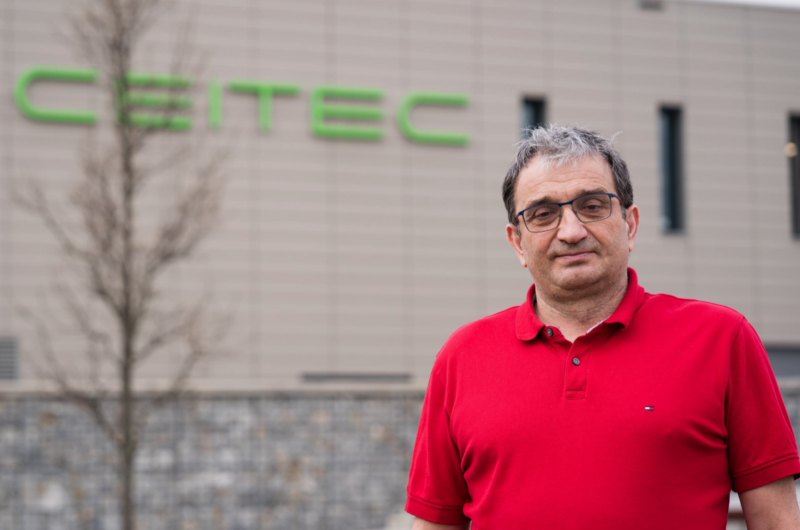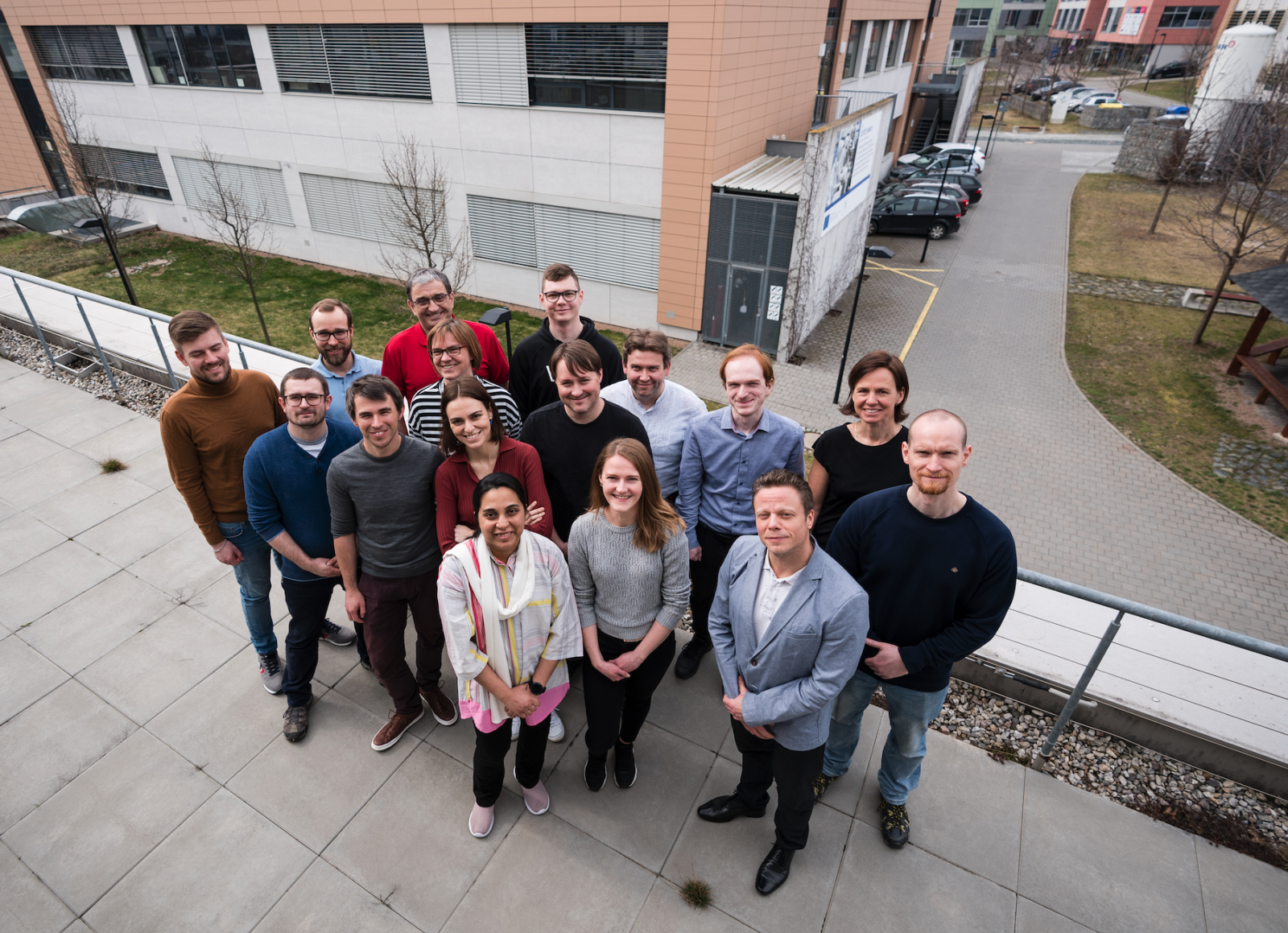People
Professor Karel Maca revealed how his sporting spirit is reflected in the leadership of the research team

He has played football for over 30 years, and during his studies also for Brno Zbrojovka. But which team this fan's heart beats for is clear to anyone who comes to his office. The red-and-white mug from which he drinks herbal tea and the wall calendar with snapshots of the players of Slavia Prague reveal it. Although he used to be a playing member of the football eleven on the pitch, he is a coach at CEITEC BUT. He has been leading a new research group – Advanced Multifunctional Ceramics – for one year now. Currently his research team is working on 7 projects. The largest one, from the Horizon Europe programme, will "bring" almost 2 million euros to CEITEC BUT.
What steps are needed to start a new research group?
First you need to build a team and have a portfolio of projects. For us, it was a bit more complicated because we already had a ceramic group. It was led by Professor Trunec. We were working in quite large laboratories, and in order to finance their operation, we had to design and solve a lot of projects, which was already unsustainable for one leader. Moreover, we both had our own team of people even then and we each had a slightly different focus. For this reason, we decided to split the agenda. It was a logical step. Now everything is better managed and it is also more efficient to work with a closer team, but we continue to work together.
What is the focus of your team?
We are involved in basic and applied research in advanced ceramic materials. We have it split almost in half. As a physicist, I tend to do more basic research. Our group focuses on several research areas, including advanced ceramic materials with multifunctional properties or ballistic resistant ceramic and composite materials. This is neatly described and explained on our website.
How many people do you manage?
Currently 18, with a total work capacity of a little over 9 FTEs. We have a few projects coming out now, so we will be hiring more people. I'm also currently looking for a good manager for our new European project, which is the biggest project I've handled so far. I am really extremely happy about that. I'm also grateful for the age composition of our team. Don't imagine a team of 60-year-olds. I am of course the oldest, the other one is just over 45 and the others are around 35–40 years old, which are people at the beginning of their scientific careers. Because of my experience in team sports, I have my own idea of what the ideal composition of a team should be in order to be stable and efficient.
Does your football experience have any other impact on your scientific career? Do you ever put yourself in the role of a referee, for example, and pull a yellow out of your pocket?
(Laughs) I don't hand out yellows. Rather than a referee, I would like to be a good coach who can motivate players and evaluate them correctly. I also feel responsible for my team, most of whose members already have families. Thanks to the projects we've got now, we've managed to stabilise financially and now all we have to do is score goals and go to the cups (laughs).
What demands do you have on your new staff?
I prefer to choose people I have "raised". So my PhD students. The best option is if a PhD student travels for maybe two years and then comes back. Now one of them is gaining experience at Oxford, for example. But I have also had good experiences with staff who have come to us from other departments and enriched our knowledge with new methods and approaches.
Where do you send students for internships? Where are the best in your field?
I have already mentioned the UK, and in Europe there is Germany, Spain, Austria, Finland, Slovenia. I personally have a great and long-standing collaboration with researchers in Trencin, Slovakia. It sounds trivial, but a great centre of excellence, FunGlass, has developed there, which keeps the University of Trenčín at a high level on a par with Western universities. We often send our students there, and in turn their students come to us. We also had an intensive cooperation with a prominent professor in Stockholm, but unfortunately he died of covid-19. The vast majority of people in my team have been abroad for at least six months.
And where would you go for Erasmus?
Greece, perhaps the University of Crete. I love Greece, I've been there about fifteen times (laughs). I've always thought if I could choose an internship, it would be in Greece. But unfortunately, there is no quality advanced ceramics focus there. If there was, I would have started working with them a long time ago (laughs).
What projects is your research group working on?
We have faced a difficult situation in the last few months, because we have three big projects coming to an end, and because of the pandemic and the war in Ukraine, project opportunities are quite limited. In our area, for example, the Ministry of Education, Youth and Sports is launching fewer projects than before, and the success rate in the Grant Agency is falling again due to increasing competition. Resources are limited and savings are being made. We have therefore had to find a way to replace the projects that have been terminated in such a reduced competition. Fortunately, we have been very successful. We got one project from the Czech Grant Agency, two from the Czech Technology Agency and the last one from the European Union's Horizon Europe programme. I prepared for all scenarios, even catastrophic ones, but I did not expect that we would get four projects. I am really happy about that.
Can we say a few sentences about each project?
One of the projects, which is also my first applied research project, deals with the development of a filtration device for electrical insulating fluids in transformers. I will be working on this with two companies from the Brno region. It is a project with an ecological overlap, which should replace cellulose filters with ceramic ones, which would have greater durability and higher functionality. In the area of basic research, we obtained a project on advanced composite complex ceramics, which are expected to have absolutely exceptional properties compared to current materials. Another interesting project focuses on advanced ballistic shields for personal protection. We have been working on this since last year for the Ministry of the Interior. It is the domain of colleagues who have even set up a successful spin-off company, TriCera. In addition to shields, this year's new project will focus on next-generation safes.
Protective shields made of ceramic? I mean, it's a fragile material.
They invent different composites – ceramic with metal, ceramic with polymer, etc. It's evolved a lot in the last ten years. Ceramic is fragile but very hard, abrasion resistant and can withstand high temperatures. If a bullet hits the shield, it might shatter at the point of contact, but that's fine with us. The important thing is that it holds the bullet. And only Old Shatterhand could shoot several times in the same place (laughs).
In your biggest Horizon Europe project, what will you be working on?
We will start working on it together with our colleagues from Trenčín in June. Companies from the South Moravian and Trenčín regions, the public sector and non-profit organisations are also involved. This is one of the conditions of the project. In the next four years, we aim to create a glass-ceramic hub (GlaCerHub). GlaCerHub will be an open platform between its founding members and others who will join it during the project implementation. It is to ensure global competitiveness in the ceramics and glass sector, provide information on new technologies, educate and transfer new knowledge among academics and employees of regional companies through numerous workshops and much more. It is to this ambitious project that I am looking for a manager to help us see through our "scientific blinders".
What are your favourite projects?
Those that are dedicated to basic research, and at the same time those that I can collaborate on with someone outside CEITEC.
Let's end with your favourite topic – football. I think you're a coach now, would you rather be someone else?
That's a great question. I guess I'm a coach now, unfortunately time can't be stopped. In my youth I played in the third league for Uherský Brod and for a while also for Zbrojovka and I would still prefer to be a central midfielder and enjoy the game. That's why I keep telling all my "players" to be happy to do research. I am often just a manager and a clerk now.
Author: CEITEC BUT
Simpler bone regeneration process. CEITEC researcher tests unique combination of titanium and hydroxyapatite
A priceless offer. CEITEC will help researchers to bring the results of their work to the market
“I expected chaos, dirt and mess,“ says a researcher from CEITEC BUT who taught children in the Himalayas
Science is made by people and people are driven by passion. However, passion alone is not enough, says Vinicius Santana
AI matters. CEITEC helps Czech companies test industrial applications with artificial intelligence